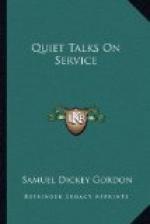This was David’s rule. He said: “Thy statutes have been my songs in the house of my pilgrimage."[18] He is not speaking of the time when he was acknowledged king over both Judah and all Israel, when the fortress of Jerusalem was his own capital. No, he is talking of the earlier days of his pilgrimage. When he was being hunted over the Judean fastnesses by King Saul. When with his band of faithful men he was ever fleeing for his life. He slept in caves and dens or out in the open, and always with one eye open. There he used to sing God’s praises. A messenger would come breathlessly in some morning with the news that Saul was just over yonder ravine with a thousand men. And as David planned what best to do, and arranged his men, he would be singing.
Maybe he would sing that Twenty-third Psalm:
“For Thou art with me;
and Thy rod
And staff me comfort still.”
Or, maybe sometimes,
“To Thee I lift my soul;
O Lord, I trust
in Thee:
My God, let me not be ashamed
Nor foes triumph
o’er me.”
Or, likely, he often sang:
“The Lord’s my
light and saving health;
Who shall make
me dismayed?
My life’s strength is
the Lord; of whom
Then shall I be
afraid?”
Or if perhaps Ezra wrote this psalm it takes one back to his weary, dangerous journey over from Babylon to Jerusalem and the very difficult work he was undertaking in Jerusalem in reorganizing the life of the people again. He used to sing on the way, and through all his difficulties.
It is a great rule.
“When the day is gloomy
Sing some happy
song;
Meet the world’s repining
With a courage
strong.”
Some one asked me if whistling would do. She was a busy housewife and said that was her rule. I have gone to singing myself. But maybe whistling is just as good. I’m inclined to favor giving it a place within the range of this rule.
There’s a bit of deep, simple philosophy here. Music is divine. There is no music in the headquarters of the enemy. He has used it a great deal on the earth. That’s a bit of his cunning. But he always has to steal it from God’s sphere, and work it over to suit his own crafty purposes. Music, singing, is an open doorway for the Spirit of God to come in, and come in anew and move freely. Its sweet harmonies found their birth in the presence of God where sweetest harmonies reign. Lovers of music should be lovers of God, for He is the one great Master-musician.
When Elisha was asked to prophesy victory for Israel over the enemy at one time, he refused. He was not in harmony with this king nor his associates. His spirit refused to respond to their request. But at their urgent request he yielded, and called for a musician. And as the strains of music fell upon his ear and entered into his spirit he felt the divine presence and influence anew. We should use the musician more in our days of battle. And God has wonderfully provided every one of us with a music-box of sweet melodies. If we would only open the lid, and let frequent use wear off the rust, and sing His praise more. In music God speaks to us anew with great power. This is the second rule, thankful for anything.




